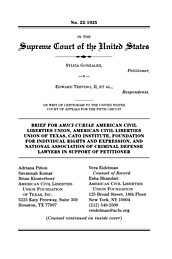Learn more about Cato’s Amicus Briefs Program.
Sylvia Gonzalez was a city council member in a small Texas town who spoke out against the town’s leadership. When she organized a petition to remove one member of town leadership from office, she allegedly temporarily misplaced the petition in her personal folder for a brief period. For this, she was eventually charged with the crime of concealing an official document, and she was arrested and spent a night in jail. Eventually the charge was dropped, but Gonzalez sued the mayor and other city officials for retaliatory arrest.
The statute books are littered with crimes that citizens commit every day but typically are not charged with, like jaywalking. These crimes unfortunately give the government many tools at its disposal to selectively punish citizens with arrest and prosecution as retaliation for exercising their constitutional rights. To fight that risk, citizens can sue public officials who arrested them as retaliation for their speech. Such claims are successful if the citizens can prove that they would not have been arrested for the same conduct had they not engaged in protected speech. Gonzalez had a strong case for retaliation. Yet the Fifth Circuit held that under a 2019 Supreme Court precedent, Gonzalez could not win because she could not point to specific examples of others who had done the same thing she had done but were not arrested.
Now the Supreme Court is considering Gonzalez’s case, and Cato has joined an amicus brief supporting her, alongside the ACLU, ACLU of Texas, Foundation for Individual Rights and Expression, and National Association of Criminal Defense Lawyers.
In our brief, we make two key points. First, courts should be able to look to a wider range of evidence in cases where an arrest came after significant deliberation rather than as a split-second decision. In some cases, there is strong evidence that multiple government actors together concocted a retaliatory plan and past protected speech clearly played a role in their decision. Courts should be permitted to look at such evidence when it is available.
And second, we argue that courts should be permitted to look at evidence beyond narrow comparisons to others who went uncharged, at least when it is unfeasible to obtain the data necessary to make such comparisons. In this case, it is not reasonable to expect Gonzalez to find other people who put government documents in a folder in the same way she did, but who had not spoken out against the local government and were not charged. Gonzalez has shown that the law at issue has never been used before to prosecute a case like hers, and the court should have been allowed to weigh that fact when reviewing her claim.
Wherever the Supreme Court draws the line for permissible evidence of retaliatory intent, the Fifth Circuit’s approach was far too narrow. Artificially limiting the evidence courts may consider in retaliation cases will only allow government officials to get away with more retaliatory arrests, and such arrests are a threat to the free speech of anyone who speaks out in a way the government does not like. The Supreme Court should reverse the Fifth Circuit and allow Gonzalez to present her full range of evidence that she was retaliated against for her speech.

This work is licensed under a Creative Commons Attribution-NonCommercial-ShareAlike 4.0 International License.





